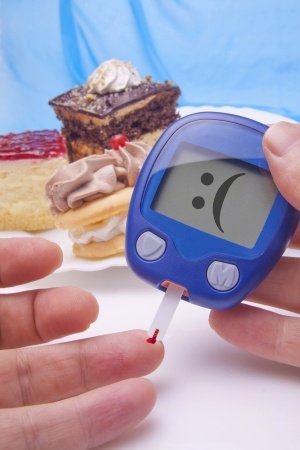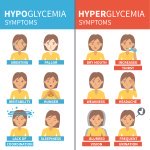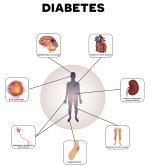Hypoglycemia Diet

It may seem counter intuitive, but the best hypoglycemia diet is the same diet that you should follow if you have type II diabetes. The connection is that both hypoglycemia and diabetes are caused by poorly controlled blood sugar.
Why Keeping Blood Sugar Controlled is Critical to Living with Hypoglycemia
Hypoglycemia is the medical term for low blood sugar. Having sustained low blood glucose is relatively rare. Symptoms include shakiness, weakness, faintness and confusion. In people who routinely experience low blood sugar, the body produces too much insulin in the presence of glucose.
In other words, their blood sugar levels are not being well controlled by their body. The best way to control hypoglycemia and prevent hypoglycemia from turning into a more serious health problem is by following the same diet used to control diabetes.
And now, the bad news. Living with uncontrolled blood sugar is a problem. Chronically low blood sugar puts people at risk. At an extreme hypoglycemia can cause a coma and prevent people from working and driving machinery.
Severe hypoglycemia is rarely seen naturally, it is usually the result of a diabetic injecting themselves with too much insulin. Because hypoglycemia is caused by uncontrolled blood sugar, people with hypoglycemia will usually also experience hyperglycemia (too much glucose in the blood).
Why Keeping the Right Balance Can be Difficult
Controlling blood glucose can be difficult, in huge part because the human digestive system depends so much on the proper interaction of the liver and pancreas to do so.
At mealtimes, the starch in our diets (bread, potatoes, tortillas, corn side dishes, cereal, milk, other sugary drinks, fruit, and desserts) convert quickly to glucose.
The problem is that our bodies can only store a small amount of glucose in the liver and muscles as glycogen and having even a moderate increase of sugar in the blood causes problems. As a result, when faced with a large influx of sugar in the blood, your body will quickly release large amounts of insulin to shuttle the excess sugar into your fat cells to prevent damage. This often result in a sharp decline in blood sugar that will cause you to crave more sugar.
The next time you eat a sugary breakfast cereal along with some juice, notice how long it takes before you are craving a soda, a candy bar, bag of chips or a doughnut. This is your body’s signal that blood glucose has fallen low. You are now riding a blood sugar roller-coaster caused by a high carbohydrate, low fat diet.
The Low-Carbohydrate Hypoglycemia Diet
To get off the blood sugar roller-coaster the most effective thing you can do is to start eating more protein and healthy fats. The low-carbohydrate hypoglycemia diet is not about losing weight, although weight loss is common for those that are already overweight.
- The goal of a low-carb diet is to limit the amount of sugar and carbohydrates in your diet so that the organs that control blood sugar have a chance to recover.
- The goal of a hypoglycemia diet is to keep your post-meal blood sugars in the normal range and prevent your body from needing to release large quantities of insulin.
You can eat as much food as you want on a "diabetes diet", as long as the food doesn't raise your blood sugar (Ruhl, 2014). According to Janet Ruhl, the author of “Blood Sugar 101”, glycated hemoglobin (HbA1c) test results should fall in the 5% range, which doctors consider normal (Diabetes.co.uk, 2015).
If you are over your ideal weight, you will likely find yourself losing some weight when you adopt a low-carbohydrate hypoglycemia diet because high blood sugars make us more insulin resistant and that causes weight gain. As well, a low-carb diet will help you lose weight without trying: when you flatten out your blood sugar after meals, you eliminate the overwhelming hunger that comes with blood sugars that cycle up and then drift back down. When you aren't starving all the time, losing weight is a lot easier.
The Top Low-Carbohydrate Diet That Doubles as a Great Hypoglycemia Diet
The top low-carb diet that can help you get a grip on your blood sugar fluctuations out of the box is the Atkins Diet. The Atkins diet has evolved over time to not only provide great blood sugar control, but also overall health improvement. For example they now recognize that not all fats are created equal and provide solid recommendations about the best fats and toxin-free protein sources to include in your diet. If you are looking for the simplest way to get started, this diet is it.
Recap: Why it is Important to Maintain Blood Sugar Levels as Close to Normal as Possible
The Diabetes Control and Complications Trial (DCCT) was a major clinical study involving 1,441 volunteers and 29 medical centers in the United States and Canada.
Over the 10-year longitudinal study, the National Institute of Diabetes and Digestive and Kidney Diseases demonstrated that keeping blood glucose levels as close to normal as possible slows the onset and progression of the eye, kidney, and nerve damage caused by diabetes.
In fact, it demonstrated that any sustained lowering of blood glucose helps, even if the person has a history of poor control.
More Information
References
- Centers for Disease Control and Prevention (2015). National Center for Health Statistics, Division of Health Interview Statistics, data from the National Health Interview Survey.
- Diabetes.co.uk (2015). The low-carb diet. Retrieved from, http://www.diabetes.co.uk/diet/low-carb-diabetes-diet.html.
- Diabetes Control and Complications Trial and Follow-up Study, The (2014). National diabetes information clearinghouse.
- Ruhl, J. (2014). Blood sugar 101. Retrieved from, http://www.phlaunt.com/diabetes/sp3index.php.
- Tirosh, A., Shai, I., Tekes-Manova, D., Israeli, E., Pereg, D., Shochat, T., Kochba, I., and Rudich, A. (2005). Normal fasting plasma glucose levels and type 2 diabetes in young men, N Engl J Med., 353 (14):1454-62. Retrieved from http://www.ncbi.nlm.nih.gov/pubmed/16207847.



New! Facebook Comments
What do you think? Share your thoughts below...